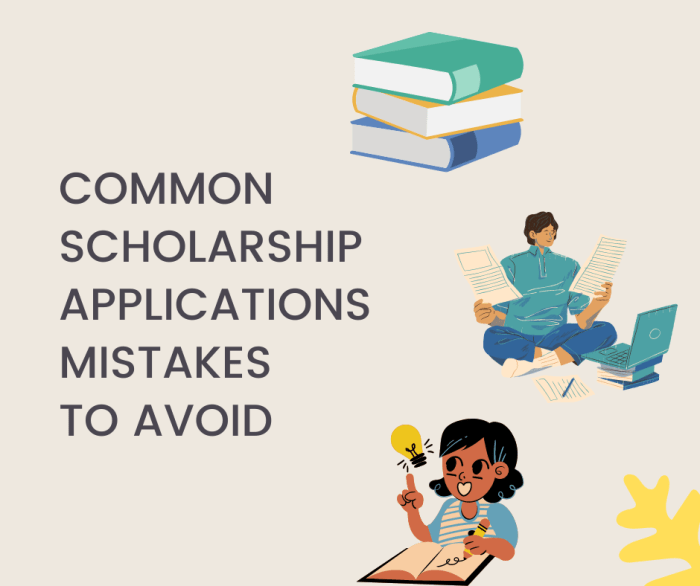5 Common Mistakes to Avoid in Scholarship Applications sets the stage for this enthralling narrative, offering readers a glimpse into a story that is rich in detail with search engine journal author style and brimming with originality from the outset.
Avoiding common mistakes in scholarship applications is crucial for students looking to secure funding for their education. Let’s delve into the top blunders to steer clear of when applying for scholarships.
Common Mistakes in Scholarship Applications

When applying for scholarships, students often make avoidable mistakes that can significantly impact their chances of success. By identifying and steering clear of these common errors, applicants can improve their prospects of securing the financial support they need for their education. Let’s delve into the top 5 mistakes to avoid in scholarship applications.
Want to know how to qualify for merit-based scholarships in college? Discover 5 Ways to Qualify for Merit-Based Scholarships in College and increase your chances of receiving financial aid based on your achievements.
1. Incomplete Applications
Submitting an incomplete scholarship application is a grave error that can cost students valuable opportunities. Whether it’s failing to provide all required documents or neglecting to fill out essential sections of the application form, incomplete submissions can lead to automatic disqualification.
Looking for scholarships to support your nursing education in 2024? Check out this list of the Top 20 Scholarships for Nursing Students in 2024 to help you achieve your academic goals.
2. Missing Deadlines
Missing deadlines is another prevalent mistake that can hinder a student’s chances of receiving a scholarship. Scholarship committees typically receive a high volume of applications and strictly adhere to deadlines. Failing to submit your application on time demonstrates a lack of punctuality and commitment, which can reflect poorly on your candidacy.
Struggling to win scholarships? Implement these 6 Tips to Increase Your Chances of Winning Scholarships and stand out from the competition with a compelling application.
3. Lack of Attention to Details
Overlooking small details in your scholarship application, such as spelling errors, formatting inconsistencies, or missing signatures, can detract from the overall quality of your submission. Attention to detail is crucial in conveying professionalism and diligence to the selection committee.
4. Generic Essays
Crafting generic essays that lack personalization and fail to highlight your unique qualities is a common mistake among scholarship applicants. Tailoring your essays to each scholarship opportunity and showcasing your individual experiences, goals, and aspirations can significantly enhance your application’s competitiveness.
5. Failure to Follow Instructions
Failure to follow the specific instructions provided by scholarship programs is a critical error that can diminish your chances of success. Whether it involves word count limits, essay topics, or submission formats, deviating from the guidelines set forth by the scholarship committee can signal a lack of attention to detail and adherence to rules.
Lack of Attention to Detail

When it comes to scholarship applications, attention to detail is crucial. Overlooking even the smallest details can have a significant impact on the success of an application. In this section, we will discuss the importance of paying attention to details, provide examples of how it can affect an application negatively, and offer tips on how applicants can improve their attention to detail.
Looking to pursue a Master’s degree abroad without financial burden? Explore these 5 Fully Funded Scholarships for Master’s Degree Programs Abroad to fulfill your academic aspirations without worrying about tuition costs.
Importance of Attention to Detail
- Missing deadlines: Failing to submit all required documents or missing the application deadline due to oversight can result in disqualification from the scholarship.
- Formatting errors: Neglecting to follow formatting guidelines such as font size, margins, or word count can make the application appear unprofessional and sloppy.
Examples of Negative Impact
- Spelling and grammar mistakes: Typos and errors in spelling or grammar can create a negative impression on the reviewers and indicate a lack of attention to detail.
- Incomplete information: Leaving out important details or failing to answer all questions in the application can weaken the overall strength of the application.
Tips to Improve Attention to Detail
- Proofread carefully: Take the time to review your application multiple times to catch any errors in spelling, grammar, or formatting.
- Follow instructions: Read the application guidelines thoroughly and make sure to follow all instructions provided by the scholarship committee.
- Get a second opinion: Ask a friend, teacher, or mentor to review your application and provide feedback on areas that may need improvement.
Not Tailoring Applications to Each Scholarship: 5 Common Mistakes To Avoid In Scholarship Applications

Tailoring scholarship applications to specific scholarships is crucial for increasing your chances of success. By customizing your application to fit the requirements and preferences of each scholarship, you demonstrate your genuine interest and commitment to the opportunity. This personalized approach shows the selection committee that you have taken the time to understand their organization and how you align with their values and goals.
Consequences of Submitting Generic Applications
Submitting generic applications can have negative consequences on your chances of receiving the scholarship. When your application does not address the specific criteria and objectives of the scholarship, it may come across as lazy or insincere. This lack of effort can lead to your application being overlooked in favor of candidates who have taken the time to tailor their materials.
Are you an international student looking for scholarships? Follow these 10 Steps to Apply for Scholarships as an International Student to navigate the application process and secure funding for your studies abroad.
- Missed Opportunities: Generic applications may fail to highlight your unique qualifications and experiences that make you a strong candidate for the scholarship.
- Lack of Relevance: Without tailoring your application, you risk including irrelevant information that does not demonstrate your suitability for the scholarship.
- Loss of Competitive Edge: Customizing your application allows you to stand out from other applicants by showcasing how you specifically meet the scholarship requirements.
Strategies for Customizing Applications to Different Scholarships, 5 Common Mistakes to Avoid in Scholarship Applications
To tailor your applications effectively, consider the following strategies:
- Research Each Scholarship: Take the time to understand the mission, values, and requirements of each scholarship to align your application accordingly.
- Highlight Relevant Experiences: Showcase experiences, skills, and achievements that directly relate to the scholarship criteria to demonstrate your suitability.
- Personalize Your Essays: Craft personalized essays that address specific prompts and reflect your genuine interest in the scholarship opportunity.
- Customize Letters of Recommendation: Provide recommenders with information about the scholarship to help them tailor their letters to support your application.
- Edit and Proofread: Ensure that each application is free of errors and tailored to the specific scholarship to make a strong impression on the selection committee.
Missing Deadlines

Missing deadlines in scholarship applications can have serious consequences for applicants. It is crucial to understand the significance of meeting these deadlines to maximize your chances of securing financial aid for your education.
Importance of Timely Submission
- Submitting applications late can result in disqualification from consideration for the scholarship.
- Many scholarship programs have strict deadlines that are non-negotiable.
- Late submissions may reflect poorly on your time management skills and commitment to the scholarship.
Tips for Staying Organized
- Set up a calendar or use a planner to keep track of different deadlines for various scholarships.
- Break down the application process into smaller tasks and assign deadlines to each to ensure timely completion.
- Give yourself some buffer time before the actual deadline to account for any unexpected delays.
- Reach out to recommenders and request documents well in advance to avoid last-minute rush.
Lack of Proofreading

Proofreading is a crucial step in the scholarship application process that should never be overlooked. It involves carefully reviewing your application to identify and correct any errors in grammar, punctuation, spelling, or formatting. Neglecting to proofread can significantly impact your chances of securing the scholarship you are applying for.
Importance of Proofreading
- Proofreading ensures that your application is free of typos and grammatical errors that can create a negative impression on the scholarship committee.
- It helps to showcase your attention to detail and professionalism, reflecting positively on your overall application.
- An error-free application demonstrates your commitment to presenting the best possible version of yourself to the selection panel.
Effective Proofreading Techniques
- Take a break before proofreading to approach your application with fresh eyes.
- Read your application out loud to catch any awkward phrasing or errors that may have been overlooked.
- Use spelling and grammar check tools but do not solely rely on them, as they may miss certain mistakes.
- Ask a friend, family member, or mentor to review your application for a second set of eyes.
- Print out a hard copy of your application to review it in a different format, as errors may be more noticeable on paper.
In conclusion, mastering the art of scholarship applications involves meticulous attention to detail and strategic planning. By steering clear of these common mistakes, applicants can significantly enhance their chances of securing financial aid for their academic pursuits.